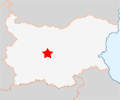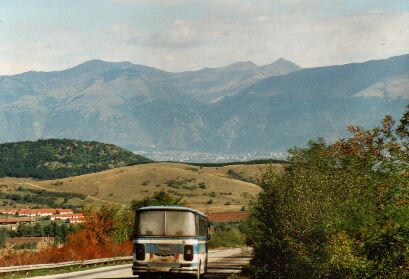Official Name
Карлово (Karlovo, also Karlowo). Before the occupation by the Ottomans, the same town was known as Sushitsa. During the 14th century it was eventually renamed. The owner of the property was the Ottoman nobleman Kaarlazade, and so the name Karla Ova (Land of Karla) was created.
Location

| ||
| Karlovo |
The city sprawls along the southern foot of the Стара Планина (Stara Planina aka Balkan Mountain Range) in a long valley, stretching from the east to the west, called Розовата Долина (Rosovata Dolina, Valley of Roses). The valley starts around 60 km north of →Plovdid. The railway from →Sofia to →Burgas runs through the valley and Karlovo. Further to the north, the famous →Troyan Pass and mountains as high as 2,300 m can be found.
Population
Slightly less than 30,000. A small town by all means.
Orientation
Wide parts of the old city centre - among the traditional buildings there, many are built in the Bulgarian revival style, referring to the national revival movement in the 19th century during the fight against the Ottomans - remained in a remarkably good state and mix with some less interesting buildings erected in the 1950ies. The centre of town is marked by a bazaar-like, quite narrow market (be aware of pickpockets!)
History
Karlovo has never gained more than just local importance. It's a small town today, and this is what it was in history. Some 2000 years ago, an important Roman trading route connecting Thracia with the Danube area followed the Valley of Roses. Around Karlovo, remainings of ancient Thracian settlements have been excavated.
It should be mentioned, that one of the most important Bulgarian national heroes, Vassil Levski, was born in Karlovo. That was in 1837. He formed one of the most powerful resistance groups against the Ottomans and fought for an independent Bulgaria. However, due to a betrayal he was caught and sentenced to death by the Turkish rulers in 1873.
Eversince, Karlovo has been known as a centre for the production of wine and rose oil - the latter is not less than one of the most famous export goods of the small country. Today, Karlovo is suffering serious economic problems, including a very high unemployment rate.
Getting there / transportation
Karlovo is easily accessible by train, since all trains running from →Sofia to →Burgas stop here. To get there from →Plovdiv, the bus might be a better option. By bus, it takes slightly more than one hour, by train it will take some more time. Nearby →Troyan Pass is the gateway to North Bulgaria direction Pleven. But note that the pass road occassionally becomes impassable in winter.
If you want to see more from the Valley of Roses, it's a good idea to take a train or a bus to the east, direction Казанлък (Kazanlak). This town is around 35 km away and with its 60,000 inhabitants it's the biggest town in the valley (for further information see below).
A walk through the old city centre of Karlovo doesn't take a long time. There are some beautiful, traditional houses built during the Bulgarian national revival time, and that's it - Karlovo is small and there's not much more to see. However, the city is a convenient base for hiking tours in the mountains and for various interesting places in the Valley of Roses.
It's not a single sight but the general impression that makes the Розовата Долина (Rosovata Dolina, Valley of Roses) a worthy destination. High mountains in the north, rolling hills in the south, vineyards and flower fields to the east and west as far as the eye can see (unless you are there in winter...). Especially rose cultivation in the area around Karlovo and Kazanlak are worldwide famous. The commercial rose cultivation is possible thanks to the predestined location - the mountain range in the north prevents the valley from cold winds in winter. A special sort of rose, the oil rose, is cultivated and used to extract essential oil. But the production of rose oil is everything but easy. For 1 kilogramme of rose oil, 3.5 tons (!) of rose leaves are necessary. Just to give an idea of the effort - a professional rose leaf picker can harvest 35 kilogramme a day. Which means that one picker would have to work around 100 days to collect enough leaves for producing 1 kilogramme of rose oil. And that's not all - the area needed for the cultivation is extremely large. To cultivate roses necessary for the production of 1 kilogramme of rose oil, some 1,000 hectare are needed. Hence, the price of rose oil doesn't come as a surprise - it's twice as expensive as pure gold. Bulgaria has an estimated 80 % share of worldwide rose oil production. The oil is mostly used for the production of perfumes. Obviously relatively expensive perfumes.

| ||
| Entering the Valley of Roses - with the Stara Planina in the back |
So much about the figures - but what's to see? There's a rose museum in Karlovo. Furthermore there are some rose festivals in the area. And the fields themselves - they are in full blossom between June and August, depending on the weather, the location and the type of rose. Additionally, lavender, peppermint, sage and other types of oil are produced in the valley. And vine, of course - hey, it's Bulgaria!
It seems like there aren't many options. There are small hotels here and there, but private accommodation is probably the best bet. However, it's easy to do it as a day trip from Plovdiv.
- bulgaria.domino.bg/karlovo/: Official website of Karlovo. Contains useful information, English version available.
- foreigneye.net/galleries/Bulgaria/karlovo Some impressions from Karlovo and it's surroundings. English.
Do you have or do you know a good website about Karlovo? Don't hesitate, let me know! After checking it, I would love to add it to the link list. You can submit a link by using the →contact form. Note that commercial websites will be treated differently.
©2024 Europe-East.com

 Albania
Albania Bulgaria
Bulgaria